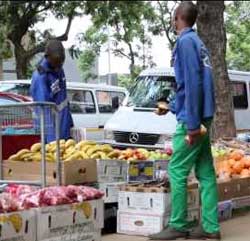
Lindiwe Zulu, newly appointed Small Business Development Minister, has the task of driving this in an environment hampered by red tape and regulatory complexity, a poor skills base and a culture of dependency.
Scepticism surrounds the creation of a new ministry that might conflict with others in the economic cluster and lead to turf wars. Zulu says her role will be a coordinating one, bringing together existing government programmes and policies to grow the small business sector.
Unemployment in SA rose to 25.2% in the first quarter and the government is under pressure to turn around the ailing economy, hobbled by a crippling strike in the platinum sector and energy constraints, in order to deliver on the African National Congress (ANC) promise of a radical socioeconomic transformation.
Zulu has already been attacked by the Congress of South African Trade Unions for her comments on labour laws, but holds fast. She says she is not specifying any changes but is keen to open discussions.
"I am merely saying we need to look at the labour laws and make sure they are conducive to small and medium enterprises," she says.

This does not mean smaller business should be absolved from the responsibilities placed on them through labour legislation but it is a recognition that large companies operate in different conditions from a small, family-owned business that employs just five people.
Zulu has received many complaints from small business owners and says she would like to know what constrains their plans to grow their businesses.
"Let's have the conversation. Let's open the discussion; people cannot say the discussion is closed," she says.
"It's one thing to fight for people who are in jobs, which is a good thing, but it's another to block those who are trying to get into a particular space because they also have to make a living for themselves," she says.
Zulu has adopted a practical approach to the task ahead of her, having witnessed the potential of small business across the globe, from New York to Paris to Kinshasa. Before this appointment, Zulu was President Jacob Zuma's international relations adviser.
To avoid being sucked into endless red tape, she will immediately get to work with existing policies that are scattered across departments, including trade and industry and economic development.

South African Informal Traders Forum Leader Phumulani Ndlovu says the greatest challenge faced by the forum's 10,000 members is with the government acting against itself.
Ndlovu describes the experiences of one hawker who obtained funds and a licence to start his business through a government agency. A week later, he was stopped from selling his goods on the streets by another sphere of government. "The stock was confiscated the very next week; it is a big challenge for us. Do we approach the economic development department? The municipality?"
Zulu says political responsibility now rests in one place, which will make it easy to address the red tape in the regulatory environment. Her job will be to facilitate relationships, to get people to "hold hands" to support small business - these "people" include larger companies in the private sector, as well as national, provincial and local government.
Miriam Altman, who is on the National Planning Commission, says there are many policies in place to aid small business, including strengthening the procurement system. She also points to the regulatory environment as critical. "This does not mean deregulation, it means simplifying the regulatory environment to enable small companies to compete more easily," she says, describing the current environment as "onerous".
Altman says it is critical for the government to conduct a regulatory impact analysis before it sets regulation or policy. While a dedicated ministry for small business was not something discussed by the planning commission, she believes a dedicated department will help lift small business as a focus area for the government.

Nazeem Martin, Managing Director of Business Partners Limited, a specialist risk finance company for formal small and medium-size enterprises, describes Zulu's task as "unenviable".
He welcomes her approach of coordinating existing policies instead of starting from scratch and identifies a potential quick win for her department: getting the government to pay small businesses within the stipulated 30 days. "This (late payment) leads to massive cash-flow problems for small businesses," he says.
According to Martin another major challenge for the minister is fostering an entrepreneurial spirit among South Africans: "We need to break that culture of dependency at a school level. People have to learn to actively seek opportunities, a culture of entrepreneurship needs to be cultivated a lot more."
Zulu agrees that South Africans have to "get moving".
She will present her department's programme of action in Parliament next month.
Source: Business Day via I-Net Bridge

For more than two decades, I-Net Bridge has been one of South Africa’s preferred electronic providers of innovative solutions, data of the highest calibre, reliable platforms and excellent supporting systems. Our products include workstations, web applications and data feeds packaged with in-depth news and powerful analytical tools empowering clients to make meaningful decisions.
We pride ourselves on our wide variety of in-house skills, encompassing multiple platforms and applications. These skills enable us to not only function as a first class facility, but also design, implement and support all our client needs at a level that confirms I-Net Bridge a leader in its field.
Go to: http://www.inet.co.za